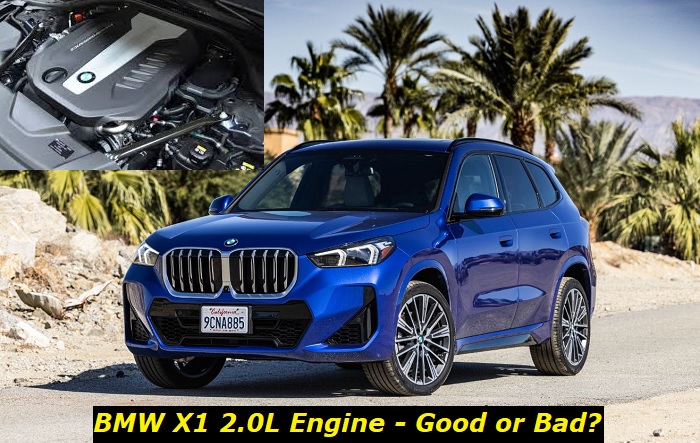If you are a fan of BMW vehicles, you should know about the new X1 generation. This is the luxury extra-small SUV that competes with the Mercedes GLA and GLB on the American market. And although Mercedes's offer looks a little better from the common sense point of view, BMW gives more emotions, so it's worth talking about.
Today, we'll tell you more about the 2-liter gasoline engine that powers the BMW X1 in the USA and will reveal its longevity and common issues. You will get to know how many miles this engine can go and what its most likely occurring issues are. We are also going to talk generally about whether this is a good engine and if it's worth its money.

Key facts and my opinion about the engine
- Production years: 2014-now
- Average lifespan of B48: 140,000-160,000 miles
- Fuel supply type: direct injection
- Power range: 156-306 hp
- Fuel efficiency: good
- Engine block material: aluminum
- Engine reliability score: low
- The most common problems: intensive oil consumption, poor balance shaft bearings, very demanding to oil quality
What should you know about the BMW X1 2.0L engine?
So, this is the engine codenamed B48. The powerplant is pretty well known because it has been in production since 2014 when it started changing the N-Series engines in most BMW vehicles. The engine is not only presented under the hood of the new X1 model. It powers a lot of other cars in the BMW range. Also, it has a hybrid version.
But in the American X1, this is the only available engine without any alternatives. It's not bad at all, so all buyers are happy with what they eventually get. But we can't say that this BMW engine comes without its share of dreadful problems that shorten its life and cut the owner's budget significantly.
Here's what you may want to know about it:
- the engine is a 2-liter, 4-cylinder turbocharged powerplant that offers 228 horsepower and 258 lb-ft of torque;
- it has the direct injection system which brings its problems but clogged intake valves are not the worst issue in this engine;
- the engine comes with FWD in a cheaper version or AWD, also it's coupled with the decent 8-speed automatic transmission only;
- the technology behind the B48 engine is traditional for BMW - Vanos, Valvetronic, chain-driven timing system, a lot of electronics;
- this is an all-aluminum engine with special super-durable coating in cylinders to prolong its life (which sounds funny after you read the problems section);
- the engine is very efficient and shows up to 24 MPG in the city and 33 MPG on highways which is pretty good;
- it will only take you 6.2 seconds to accelerate from 0 to 60 mph in this new BMW X1 which is also not bad at all.
So, you get a fast and powerful car that doesn't cost a lot in comparison with its competitors on the market and gives you a lot of emotions for your pleasure. Everything sounds great so far. By the way, the cheapest version of the X1 powered with the B48 engine in the US now costs about $36K which is great because this is the cheapest price among all luxury X-small SUVs, at least, from Europe.
The 2-liter gasoline engine codenamed B48 has been made for almost 10 years now. It's certainly living its last years but is it worth your money? We haven't answered this question yet. But we hope when you read the article to the end you will know that for sure.
What's the durability of the 2.0L engine in the new X1?
Unfortunately, BMW is now not the brand that's famous for durable and reliable engines. We've seen a lot of people struggling to get their BMWs back on track after severe engine failures. And yes, it costs a fortune unless you have a warranty that covers all the repairs or replacement of the unit.
The 2.0L B48 BMW engine is said to be able to drive about 160,000 miles which is not a lot really. But this is what it takes when you buy a very technological and modern engine with all those electronic units in it that basically make it impossible to drive your vehicle for a long time.
We can spoil your mood even more by saying that the replacement of this engine at a mileage of 40-50 thousand miles is not that rare. Fortunately, this very often happens during the warranty period. So, the last thing you want to do when you buy the new X1 (or any other BMW car) is to void your warranty and risk your money.
We should also say that we've seen 2014-2015 BMW cars equipped with the B48 engine that had more than 200,000 miles on them and were as good as new. So, we are talking about the average lifespan when we say 160K miles. And yes, you can drive much more if you provide your vehicle with a lot of TLC and you have a lot of luck.
What are the most common problems with the 2.0L engine in the X1?
Now we are approaching the most interesting part. Before we give you all those nasty facts about the B48 engine offered by BMW, we want to say that the engine is not bad. Given the harsh reality of today's car world, we understand that the race between manufacturers and new emission rules squeeze engines and make them less reliable yet more efficient.
So, don't take it too close to your heart, and don't cancel the test drive of the new X1 because it's not a bad car at all. But be ready to face some (or all) of these issues.
1. Excessive oil consumption
The new super-technological coating in cylinders didn't help much and most B48 engines start burning some oil sooner than they reach 50,000 miles. This is a frustrating fact because after that you need to check the oil level every other day to see if you need to add some oil to avoid even worse problems.
Oil consumption happens because of worn piston rings and/or bad valve seals. It's just the natural process of aging for this engine, so you can do nothing. Of course, aggressive driving will cause sooner oil consumption.
2. VANOS problems
Phasers are always a pain in your neck. But BMW phasers that are called VANOS will get on your nerves twice as much as phasers from any other engine. After you successfully drive about 60K miles in your X1, the engine may start rattling, losing power, and working harshly just because of VANOS valve problems.
Simple cleaning in petrol won't solve the issue for a long time. VANOS valves will need to be replaced most of the time, but it's not as cheap as you may want it to be.
3. Unstable idling RPM
This is one of the most common problems that owners report in BMW forums. Fortunately, in most cases, the solution is relatively cheap - you will need to invest in the new fuel tank vent valve. But one of the bad troubles is that diagnosing this issue and locating the problem may not be very easy.
In some cases, you will spend hours in the dealership or repair station before they find out what the problem is. This will mean that you will have to spend some money on labor.
4. Cooling issues
Another common issue that people report on forums is coolant loss. We don't know why but this is a single BMW engine that has so many problems with the engine cooling system. Poor cooling will inevitably lead to major problems with cylinders, pistons, and also with the head.
Once the engine is not cooled properly, the head gasket may go bad and the head may even lose its shape. This will cause extensive engine damage and it will be cheaper to replace it than to repair it. If you think that this issue is not that common, just research in the forums and you'll be surprised.
5. Electronics and ignition issues
Spark plugs and coils are a standard problem for all BMW engines now, so we won't pay a lot of attention to it. But electronics may also malfunction and it's weird because you get a highly technological and cool engine that was updated twice after its debut in 2014. And still, it has a lot of issues with electronics.
What to do to save the B48 2.0 engine in your X1 from problems?
You won't be able to save it from all issues but you may certainly prolong its life and reduce the amount of money you will need to spend on it.
Here are some of the things you should do:
- don't ever delay the oil change service;
- buy only BMW OEM filters and oil to avoid issues with quality;
- stay away from bad fuel - only high-quality certified premium gasoline is OK;
- pay attention to even minimal changes in the way the engine behaves;
- always have the engine diagnosed when it shows even minor problems;
- avoid servicing your vehicle in cheap repair shops.
We perfectly know that maintaining a BMW is not really cheap. But if you don't spend this money, you may need to spend a hundred times more when something goes wrong.
About the authors
The CarAraC research team is composed of seasoned auto mechanics and automotive industry professionals, including individuals with advanced degrees and certifications in their field. Our team members boast prestigious credentials, reflecting their extensive knowledge and skills. These qualifications include: IMI: Institute of the Motor Industry, ASE-Certified Master Automobile Technicians; Coventry University, Graduate of MA in Automotive Journalism; Politecnico di Torino, Italy, MS Automotive Engineering; Ss. Cyril and Methodius University in Skopje, Mechanical University in Skopje; TOC Automotive College; DHA Suffa University, Department of Mechanical Engineering






Add comment